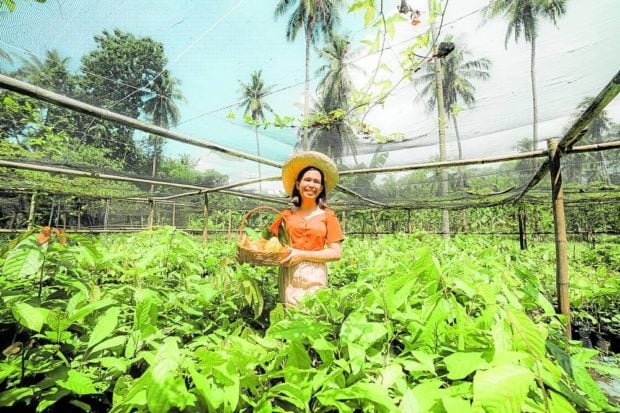Bohol’s top chocolate maker seeks more suppliers as cocoa production drops

HARVEST TIME | Dalareich Polot, known as Bohol’s “Chocolate Princess,” harvests cacao pods in a plantation in Bohol province in this photo taken in October last year. (Photo courtesy of Dalareich Chocolate House)
CEBU CITY, Cebu, Philippines — A leading chocolate maker in Bohol province is urging farmers to plant more cacao trees amid the shortage of cocoa beans in the country.
Dalareich Polot, co-founder of the award-winning Dalareich Chocolate House in Tagbilaran City, said many cacao plantations had been transformed into ricefields or used for other purposes, adding to the scarcity of supply for domestic chocolate-making industry.
The monthly demand for cocoa in the Philippines is pegged at 50,000 metric tons (MT) but the available supply is only 10,000 MT, according to Polot, also known as Bohol’s “Chocolate Princess.”
Most chocolate makers are now importing beans to cope with the demand, she said.
Mindanao, Polot said, has the largest plantations of cacao trees but these are slowly dwindling since vast areas have been transformed into durian plantations, where harvests are mostly exported to China.
Challenge
The 34-year-old Polot, who was born, raised and schooled in the provincial capital Tagbilaran City, is the gold winner of the London-based Academy of Chocolate Awards in 2019 and the recipient of the Goldman Sachs/Fortune Most Powerful Women Global Award in 2022, the first Filipino to receive the award.
Polot said they were now campaigning for the rehabilitation of heirloom cacao trees in Bohol and have been convincing farmers to continue planting more cacao trees and help preserve the tradition of making chocolates.
“This is a challenge for all of us. We need to plant more cacao trees,” Polot said in an interview on March 16.
Aside from their family’s chocolate business, Polot and her parents are now spearheading the “Adopt a Cacao Tree and Preserve Bohol’s Cacao Heritage” program, which aims to train and help farmers earn more income through the planting of cacao.
Slow return
While the Philippines is the first country in Asia to plant cacao trees, Polot said this was unattractive to farmers because of the slow return on investment.
A cacao tree has a lifespan of 100 years but Polot said it would only bear cacao pods after three to five years.
Data from Dalareich Chocolate House showed that Central Visayas only makes up 1 percent of the total production of cacao even if the region is known for its “sikwate” (chocolate drink).
Polot said they earlier managed to plant and rehabilitate 20,000 cacao trees in Bohol’s Carmen town, the site of the world-famous Chocolate Hills.
Growing up in a poor family, Polot used to help her mother make and sell “tableya” (chocolate tablet), which is sourced from cacao trees grown by generations of families in Bohol.
Her mother, Elsa, was a former street sweeper while her father, Ricardo, was a tricycle driver.
To augment the family income, Elsa also made and sold tableya, a traditional Filipino hot chocolate beverage made from 100-percent pure, roasted cacao beans that are pressed into coin-shaped tablets, and chocolates.
Their earnings helped send her and her four siblings to school.
“I saw the hard work of my parents to give the five of us a good life and to send us all to college. I told myself that one day, I can also help them and help other women by giving them opportunities,” Polot said.
Years later, Polot helped her parents innovate their products and market it to local traders, which eventually grew into the Dalareich company, the lone chocolate factory in Bohol that now sells its artisanal products nationwide.